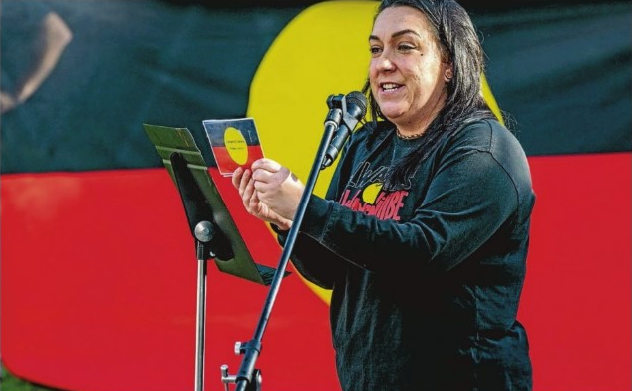Language returned to ‘spoken life’
By Stephanie Dalton, The Examiner, Friday, 14 July 2023

For the past 30 years, the Tasmanian Aboriginal Centre has worked deliberately and arduously to restore their language, palawa kani, to its spoken life.
Palawa kani is a revived language, composite of several of the estimated dozen original Tasmanian languages that were once prolific throughout the state, a consequence of the devastating impacts of invasion in colonisation on Tasmanian Aboriginal culture.
Tasmanian Aboriginal Centre language and research project officer, Daisy Allan said the language is an important aspect of Palawa culture.
“Our language lay sleeping for many years and was almost lost due to the disruption that European invasion caused to Aboriginal society,” she said.
Palawa people have worked hard to bring our language back to spoken use, with families and children, learning palawa kani from a young age through the TAC programs, to speaking, and performing both within the Aboriginal community and publicly.
“Restoring Aboriginal language is an essential aspect of culture, building Aboriginal people’s capacity to speak language and pride in seeing it restored.”
Ms Allan said this was the 30th anniversary of the TAC’s palawa kani Language Program. To celebrate, the Aboriginal community held a ceremony at Piyura Kitina / Risdon Cove in March.
“There were many speeches, language activities, and games for children,” Ms Allan said. Aboriginal community singer Dewayne Everettsmith performed new songs and children’s songs from 2005 was sung once again by the now adults, which was a very heartfelt moment for everyone.
“We tried to cover the achievements of 30 years into one presentation with many videos of short films, such as the Little J and Big Cuz cartoon, with three episodes spoken in entirely in palawa kani.”
Ms Allan said seeing palawa kani used in public infrastructure, gives international presence to the strength and resilience of Aboriginal languages.
“Like the name of the Australian Antarctic Division Ice Breaker, Nuyina – Aurora Australis, as well as virgin airlines plane Tinamirakuna named after the Macquarie River among others,” she said.
“As well, as so many members of the public and organisations speaking the original names of country for Lutruwita/Tasmania.
Ms Allan said changes to the language’s orthography, a set of conventions for writing a language, has been a natural progression as palawa kani evolves.
Initially, the TAC had decided that palawa kani should only be written in lowercase letters, but more recently they have started to capitalise place names.

